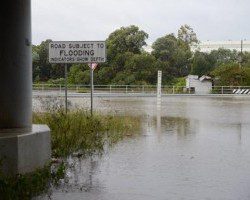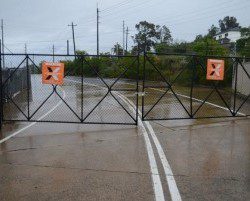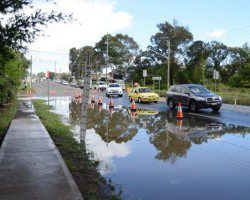
An evacuation centre was set up as residents near the rising water levels of the Georges River at Moorebank, Chipping Norton and Milperra were last night asked to evacuate their homes in response to the ongoing severe weather conditions impacting residents in South West Sydney.
Residents in parts of Milperra within the area of Rickard Road, Arthur Street, Riverside Drive, between Arthur Street and Newbridge Road; Newbridge Road, between Rickard Road and Governor Macquarie Drive; and Davey Robinson Drive, were directed to evacuate immediately by the authorities.
Where possible, residents were urged to go and stay with family or friends, or make other accommodation arrangements.
An evacuation centre was set up by Community Services at Moorebank Community Hall on Nuwurra Road, Moorebank.

It is not known how many residents left their homes for higher ground but there were reports, unconfirmed, that very few did.
The water levels have now subsided as nthe weather has improved and many residents are turning to the clean up part of this weather event.
In other parts of the region, the single road to the Casula Powerhouse was also closed to traffic yesterday after being flooded by rising waters from the adjoining Georges River.
Heathcote Road was also closed earlier in the week and diversions put in place as heavy rain continued to pound the region since the start of the working week.
In the Macarthur region SES personanel were kept busy answering calls from residents for fallen trees and other incidents.
Police and emergency services are urging people in flood-affected areas to ensure safety is maintained when cleaning up during the flood and when it recedes.

Deputy State Emergency Operations Controller, Assistant Commissioner Alan Clarke said while it’s not over yet, some areas are starting the process of recovery and that generally begins with cleaning up.
“The effects of the clean up can be just as dangerous as the floods themselves and we are appealing to the communities impacted by the floods to take all precautions and listen to advice of the emergency service agencies,” Assistant Commissioner Clarke said
Please check on your family and neighbours and share this information with anyone who does not currently have access to technology.
Household Fire Safety for flood recovery:
Members of the public in flood affected areas need to take care around their houses, properties and businesses when they start the clean up process. Some key issues residents should observe are;
* If you have lost household power and are using candles or portable light or heating sources, never leave them unattended and ensure they are kept well away from all flammable material.
* Always extinguish candles or any other open flame before going to bed.
* Don’t use LPG or solid fuel burning BBQs indoors. They give off poisonous Carbon Monoxide.
* Don’t use patio heaters or other LPG fuelled heating devices inside your home. They are designed for outdoor use only and give off poisonous Carbon Monoxide.
* If you have lost household power, turn off all appliances at the power points as they may be affected by a power surge when the power resumes.
* Any electrical appliances which may have been in contact with water must be inspected by a qualified electrician before use to ensure they can be operated safely.
* If drying clothing, keep wet clothing at least 1 metre from heaters or fireplaces and never leave them unattended. If you use a clothes dryer make sure you clean the lint filter each and every time you use it.
* If you have a garage or shed, remember to take extra care with any stored chemicals and fuels. Handle with extreme caution and use the recommended protective equipment: gloves, safety goggles, etc.
* If you are concerned about stored chemicals, contact your local Fire Station for advice.
In the event of fire, leave the house and call 000 (triple zero) and ask for Fire.
Further information including personal and household safety tips and health factsheets are available on the www.emergency.health.nsw.gov.au website.
Members of the public can also visit www.emergency.nsw.gov.au for a range of flood-related information. For all other emergencies, the public are advised to contact Triple Zero.
